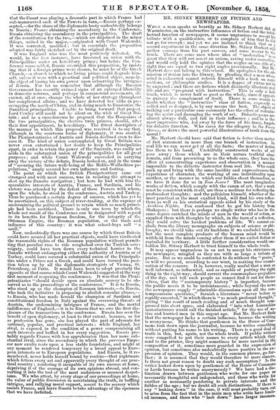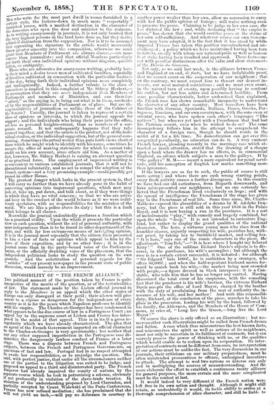MR. SIDNEY HERBERT ON FICTION AND NEWSPAPERS.
WHEN a man speaks so heartily as Mr. Sidney Herbert did a Warminster, on the instructive influences of fiction and the intel- lectual function of newspapers, it seems ungracious to accept his tribute with a qualification, or to complain of him that he did not go far enough ; and yet we are inclined to think that on a second experiment in the same direction Mr. Sidney Herbert will gather courage from his past success and come nearer to th truth. There are some men whose idea of " moderation" is s: great that they will not assert an axiom, saving under correction, and would only hold the opinion that the angles on one side of a right line are equal to two right angles provisionally. But Ms, Herbert does not belong to this school. He apologizes for the ad- mission of fiction into the library, by pleading that a man whose mind is exhausted cannot refresh himself with a book on Cask sections, or philosophic studies. It is a degree of virtue not to be expected ; and there arc fictions which distinctly illustrate real life and are "pregnant with instruction." This is only a hair truth, which is never half so good as the whole, since it appears to gainsay the complement of itself. There is some reason to doubt whether the " instructive " class of fiction, expressly so called and so designed, is by any means the best. The object of making out a particular case commonly has the effect of restrain- ing the artist and damaging the work of art. Didactic poems are almost always dull, and fail in their influence ; and he is the most impressive who, led away by the force of his fancy, forgets his didactic function. Who cares for the allegory in the Peery Queen, or draws the most powerful illustrations of truth from the moral ?
Mr. Herbert should have said that fiction is better than matter of fact statement in more than one branch of instruction. In real life we can never get at all the facts; the master of fiction has them to his hand. Unskilfully constructed works of art pass away ; those which are in their nature truthful alone remain, and from presenting to us the whole case, they have the effect of concentrating experience and observation in a manner impossible to the didactic instructor from real life. Who could pack up and bring with the same lucidity and expressiveness the experience of character, the working of one individuality upon another, or the manner in which our foibles cheat themselves, as we have it done for us in Tom lanes? The most imaginative works of fiction, which comply with the canon of art, that a work must be consistent with itself, are thus a medium for reflecting the profoundest thoughts; and the politician himself, whether of the most practical or the most exalted kind, will find his own reflec- tions as well as his oratorical appeals aided by his study of the Arabian Nights. Fox confessed that he got his history from Shakspere ; but there is perhaps no single writer who has in the same degree enriched the minds of men in the world of action, or supplied them with thoughts by which, in the turn of a reflection, they could solve the hardest problems of life. We cannot ex- clude from the library monographs on subjects of science or phi- losophy, we should take out its backbone if we excluded history, but the most complete products of the human mind would be withheld from the minds comins-° after them if we exiled fiction or curtailed its territory. A little further consideration would em- bolden Mr. Sidney Iferbert to trust himself to the whole truth. It may appear ungracious in us not to accept his strictures on the newspaper, mingled as they are with so large a tribute of praise. But as we could be contented to do without the " praise," so will we proceed, according to our wont, in making free exami- nation of the censure. It is, however, really useful that a man so well informed, so influential, and so capable of putting the right thing in the right way, should correct the commonplace prejudices of the day, and tell such people as cannot find it out for them- selves, that the ‘( contemporary history " is imperfect, because the public needs it to be instantaneous ; while beyond the news the newspapers supply " admirable discussions upon all the con- temporaneous questions," furnish a literature " never before so rapidly executed," in which there is " so much profound thought," giving " the result of much reading and of much thought com- pressed into short space, and elaborated " into what Lancashire manufacturers would call the finished article," for the use of ac- tive and hurried men in this urgent age. But Mr. Herbert finds that the newspaper lacks a certain influence, because the writing is anonymous. He thinks that gentlemen in the House of Com- mons look down upon the journalist, because he writes something without putting his name to his writing. There is a good deal of truth in this, but, again, not the whole truth. If public writers were compelled to put their names to every article which they send to the printer, they might sometimes be more careful in the composition of it, sometimes more guarded in the expression of opinion, but sometimes also undoubtedly more positive in the ex- pression of opinion. They would, in the common phrase, go fur" ther ; it is assumed that they would therefore be more sincere. Is there not great reason to doubt any such assumption? Is the writer looked down upon by gentlemen of the House of Commons or Lords because he writes anonymously ? We have had a dis- tinction drawn between gentlemen who write for one paper as necessarily thoughtful and independent, and those who write for another as necessarily pandering to private interests and the foibles of the age ; but we cloak all such distinctions. If there is any " looking down" in the case, it will most probably turn out to arise from the fact that in the main men who write have limit- ed incomes, and those who " look down." lutve Jarger inoorawl• lien who write for the most part dwell in rooms furnished in a
i
certain style, the lookers-down in much more " respectably " furnished rooms, with a marked distinction in the character of the domestics who open the door and minister to the staircase. As to writing anonymously in journals, it is not only bruited that the very highest persons in the land have done so, but they derive Wild of distinction from the supposition. Nor is it to be assumed that appending. the signature to the article would necessarily throw greater sincerity into the composition, otherwise we must grant that Members of Parliament are always sincere,—are more sincere than journalists ; and that official Members particularly put forth their own individual opinions without disguise, qualifi- cation, or ambiguity. Those who are advocates for anonymous writing, probably have in their mind a desire to see men of cultivated faculties, especially of faculties cultivated in connection with the particular business of the day, bring forth their individual opinions more completely and undisguisedly. Indeed, a further tribute to the class of journalists is implied iu this complaint of Mr. Sidney Herbert,— an assumption that they arc more independent than Members of Parliament and members of Ministries, and can therefore e afford," as the saying is, to bring out what is in them, uncheck- ed by the responsibilities of Parliament or of place. But are the responsibilities of journalism so unlike those of the Cabinet or the Senate ? Usually, the journal is taken to represent a certain class of opinions or interests, to which the journal appeals for support ; and the individuals who bring their pens into the office, act less as personal knights-errant, than as members of a cor- porate council. It not unfrequently happens that they take counsel together, and that the article is the product, not of the indi- vidual studies, or the individual suggestion, but of the general com- muning. Sometimes the actual writer thus puts forth views short of those which he might wish to identify with his name, sometimes he accepts the office of making statements for which lie cannot take credit on his own account, since others aid him. As a matter of fact, however, Mr. Sidney Herbert is raising an abstract question of no practical force. The employment of impersonal writing is so convenient to various established journals, that it will not be discontinued voluntarily, and no act to compel the adoption of the French system—not a very promising example—could possibly get passed in either House.
The greatest danger which lurks in the present system is, that it will carry us further than we have already gone in the habit of converting opinions into impersonal questions, which men may look at, take up, put down, and talk about, as if they were things in which they have no vital concern ; so that we who are active and busy in the conduct of the world behave as if we were indif- ferent spectators, with no responsibilities for the mistakes of the world. We arc like a police above its duty ; but this is a fault which belongs to all classes. Meanwhile the journal undoubtedly performs a function which has a practical utility. Upon the whole it presents the particular view on each question, without the aid of personal authority, with more independence than is to be found in other departments of the state, and with far less extraneous means of inveigling opinion. It is in the journal most especially that the citizen finds presented to him a view of facts or opinions which appeal to him by the force of their exposition, and by no other force ; it is in the Journal more than in the party-bound voice of the Parliamen- tarian, or the officially drawling voice of the placeman, that the independent politician looks to study the question on its own grounds. And the substitution of personal appeals for the "articles" of our present newspaper in the present state of public discussion, would scarcely be an improvement.



































 Previous page
Previous page